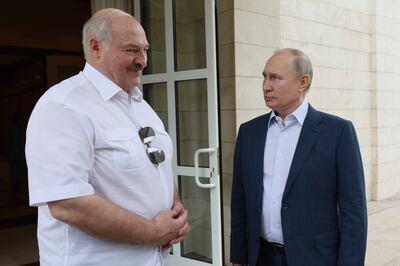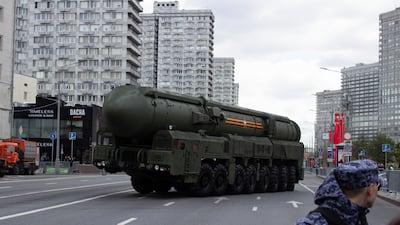Russia is likely to openly send nuclear weapons to Belarus next month, an act experts have called “reckless”, as it represents a further erosion of European arms control.
Russian President Vladimir Putin announced on Friday that he would send nuclear weapons to the neighbouring country after special storage facilities are made ready between July 7-8.
The first instance of Moscow moving such warheads outside of Russia since the fall of the Soviet Union is likely to concern Nato as well as China.
Mr Putin sees his Belarusian counterpart Alexander Lukashenko as one of his few allies and is keen to bring the leader – called “Europe’s last dictator” – closer into his circle.
Dan Plesch, professor of diplomacy and strategy at London’s School of Oriental and African Studies, said Russia knows it is in a weak position against conventional western weapons and is keen to demonstrate strength in other arenas.
“It is reckless,” he told The National.
“Presumably they will move some short-range nuclear weapons.
“They apparently will be short-range, ground-to-ground missiles and will be relatively easily [detectable] by Nato. You can’t hide them very effectively.”

The 1987 Intermediate-Range Nuclear Forces Treaty signed by the US and the Soviet Union required both parties to agree to give up all of their nuclear and conventional ground-launched ballistic and cruise missiles with ranges of 500km to 5,500km.
“That treaty very effectively has limited Putin’s options in Ukraine and he doesn’t have missiles of [longer] ranges,” Mr Plesch explained.
“That’s why these are relatively short-range missiles because long-range missiles were, broadly speaking, banned under the treaty.”
Mr Putin announced in March that he had agreed to send nuclear weapons to Belarus, pointing to US deployment of tactical nuclear weapons in a host of European countries over many decades.
“Everything is going according to plan,” Mr Putin told Mr Lukashenko, according to a Kremlin transcript of the meeting. The two leaders were discussing the planned nuclear deployment over a meal at the Russian leader's summer retreat in the Black Sea resort of Sochi.
“Preparation of the relevant facilities ends on July 7-8, and we will immediately begin activities related to the deployment of appropriate types of weapons on your territory.”
The Kremlin’s statement, released on Friday, is likely to ruffle feathers in Beijing, as it could be interpreted as “a pretext for the Americans sending nuclear weapons to Japan, [South] Korea” and other neighbouring countries.
“It will set alarm bells off, and quite rightly,” Mr Plesch added. “But it’s part of a broader ongoing arms race. The world is spending $2 trillion on the military every year.”
The development came a day after the UK unveiled a ban on imports of gold and other materials from Belarus, in a bid to prevent Russia from circumventing sanctions.
Moscow is keen to “tie in Lukashenko so he can’t get away [and] cut off all other options for him” to forge ties with the West, said Rasmus Nilsson, a lecturer specialising in Russian and Belarusian foreign policies at SOAS.
Speaking to The National, he outlined three main aims President Putin is likely to have in his plan.
“From Russia’s point of view right now, any sort of ally, any sort of friend is what they need. They can’t be picky,” he said.
First, Mr Putin will be keen to send a message that, while his troops fight in Ukraine, it is “business as usual” at home.
Secondly, Mr Nilsson echoed Mr Plesch’s comments about Moscow’s desire to keep Belarus from turning to the West.
“Lukashenko sometimes tries to do things on his own,” Mr Nilsson said. “He goes and talks to the Chinese, not necessarily thinking whether the Russians want him to do that or whether it will benefit them.
“Russia wants to keep him dependent on them.
“So the Russians are using this as another way of saying, ‘We’re going to put these weapons on your territory which means we will have an excuse to put even more soldiers in, if need be’.”
Thirdly, he suggested Mr Putin is desperate to change the narrative as Kyiv’s much-anticipated counter-offensive gets under way.
“The Russians are tying to make it look as if they’re actually having some success in something,” he said, referring to the bold movement of nukes to Belarus.
“It shows a disregard for European arms control, which is concerning.”
But he cautioned against adopting an alarmist view, pointing out that the Russians are already believed to have nuclear weapons stationed in Kaliningrad, the enclave sandwiched between EU and Nato members Lithuania and Poland.
“They can blow up large cities and things like that,” he said. “When you’re dealing with nuclear weapons nowadays, even at a tactical level, the explosion load can be so big that it is devastating.
“But I don’t think people should focus on some possible nuclear disaster. I don’t think that’s where we’re heading.
“The danger right now is not some nuclear attack – it is this gradual nuclear and general arms control in Europe and in the medium to long term that is a problem.”
Last September, Mr Putin warned the West he was not bluffing when he said Russia would use “all available means to protect Russia and our people”.


















